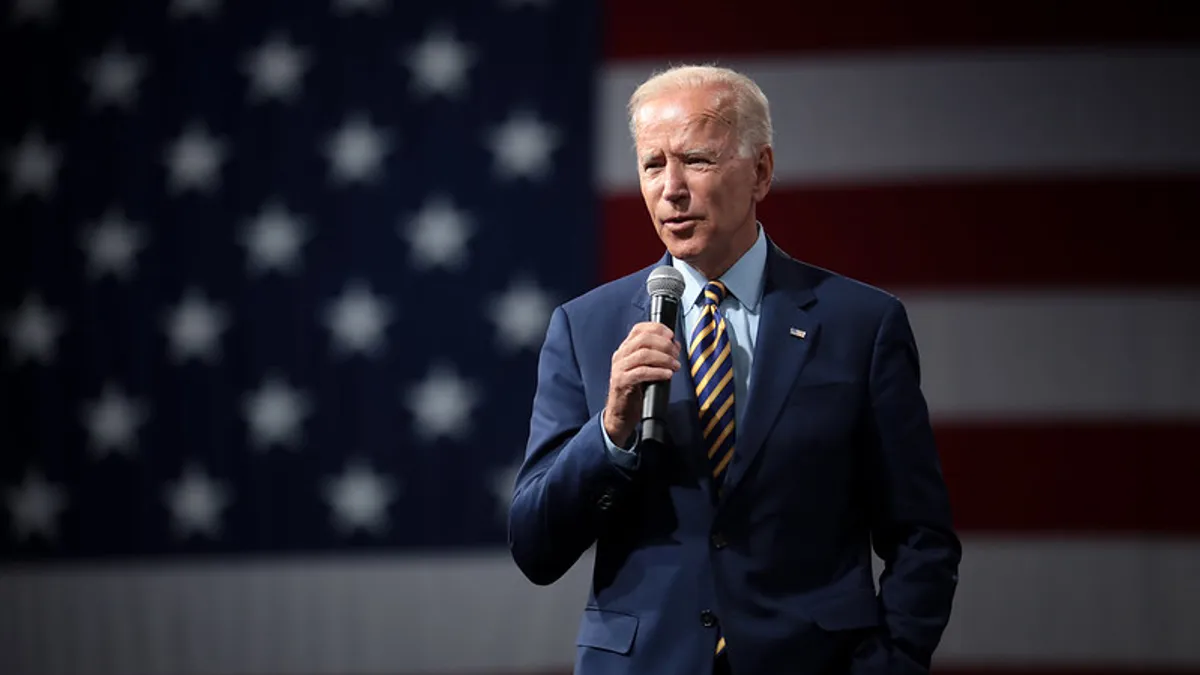Dive Brief:
-
President Joe Biden on Wednesday unveiled the details of his $2 trillion infrastructure plan that includes billions of dollars in electric vehicle, transmission and clean energy investments.
-
The American Jobs Plan proposes investing $174 billion in EVs, $100 billion in the power grid, $46 billion in clean energy manufacturing and $35 billion in research and development efforts to address the climate crisis. Biden's proposal would also create a national clean electricity standard, expand current tax credits to include a direct pay option for clean energy resources, including energy storage, and extend the tax credit phasedown another decade.
-
Biden's plan received wide-ranging support from climate and clean energy groups, as well as the advanced nuclear, carbon capture, wind, solar and energy storage industries. But Republican leadership oppose the plan's high price tag, which would be primarily funded through raising taxes on major corporations.
Dive Insight:
Biden's proposed plan would spend more on climate and clean energy than any other administration in U.S. history, according to experts, and is the next step in the president's campaign trail promise to bring the country's electricity to 100% clean electricity by 2035, and build a net-zero emissions economy by mid-century.
"As we saw in Texas and elsewhere, our electrical power grids are vulnerable with storms, catastrophic failures and security lapses [leading to] tragic results," Biden said in a Wednesday speech outlining his proposal. "My American jobs plan will put … hundreds of thousands of people to work — line workers, electricians, and laborers — laying thousands of miles of transmission lines, building a modern, resilient and fully clean grid."
The administration has previously called for the federal government to transition to an all-electric vehicle fleet, and previous executive orders have called for accelerating the buildout of transmission and clean energy. But Wednesday's infrastructure plan puts a dollar amount to some of the administration's more ambitious goals.
Biden and his team have framed his plans as a way to boost jobs and the U.S. economy, and prevent other global economies, including China, from dominating the nascent, fast growing clean energy markets.
On the electric vehicle side, the American Jobs Plan would invest $174 billion "to win the EV market," including through creating domestic supply chains, creating tax incentives around American-made EVs, and incentivizing the private sector to build a national network of 500,000 EV chargers by 2030. It would also electrify at least 20% of U.S. school buses and replace 50,000 diesel transit vehicles with zero emissions vehicles.
Biden's plan would also spend $100 billion on upgrading the power grid, including through an investment tax credit targeted at transmission that would incentivize at least 20 GW of high-voltage capacity power lines. It would also convert the 45Q tax credit for carbon capture, and production and investment tax credits for wind and solar, to direct pay, as well as establishing a credit for energy storage. Those provisions garnered praise from an array of industries, including renewables, storage and carbon capture associations, that had long advocated for such policies. The proposal would also create an Energy Efficiency and Clean Electricity Standard, requiring a certain percentage of U.S. electricity come from carbon-free resources.
Though there's a chance Senate Democrats are able to pass some of the spending provisions through a second budget reconciliation process this year, many of the broader policy changes would need the approval of at least 10 Republicans, who are skeptical of the plan's high price tag, which relies heavily on raising corporate taxes.
"President Biden's so-called 'jobs' proposal is a clear attempt to transform the economy by advancing progressive priorities in an unprecedented way," Sen. Shelley Moore Capito, R-W.Va., said in a statement. "The proposal would aggressively drive down the use of traditional energy resources and eliminate good-paying jobs in West Virginia and across the country. Perhaps worst of all, it would burden the American economy with tax increases as our country attempts to recover from economic hardship."















